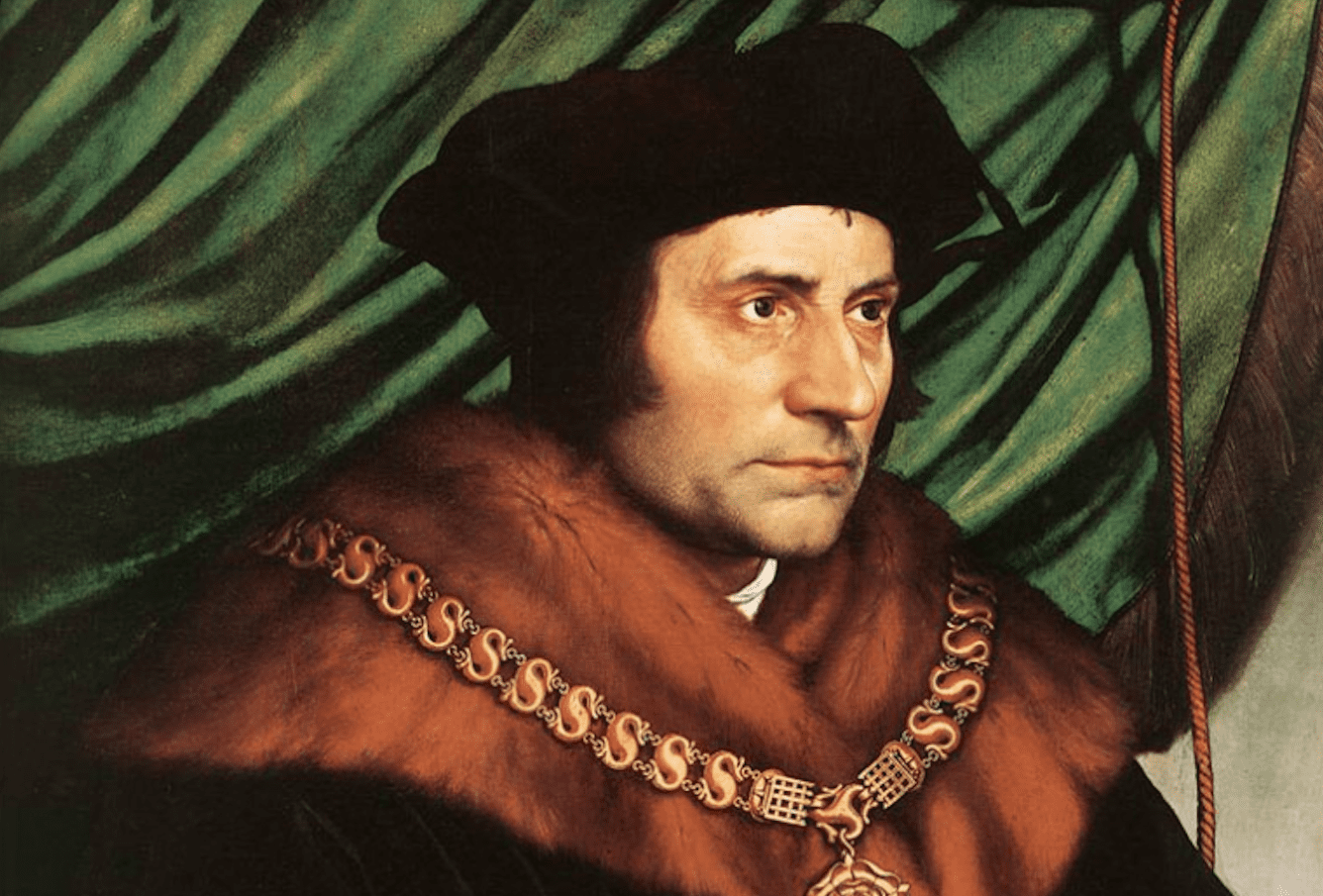‘When statesmen forsake their own private conscience for the sake of their public duties, they lead their country by a short route to chaos,’ goes the famous quote attributed to St Thomas More in Robert Bolt’s play and film titled A Man For All Seasons. At More’s time, King Henry VIII manipulated both Parliament and the Convocation of the English Clergy in order to assume control of the Church in England. Therefore, English legislators passed an act requiring all subjects of the Kingdom to take an oath to accept the King’s supremacy in spiritual affairs.
More, who had been Chancellor of England, refused to take the oath and was eventually imprisoned for fifteen months before being tried and beheaded. While in prison, he wrote several letters that bear witness to how following the dictates of one’s conscience brings a kind of ‘inward gladness… to the virtuous mind’.
For More, acts of conscience provide ‘an intimate glimpse of one’s soul’, which is constantly forsaken by government officials today.
I recently met certain friends, including a former politician from Florence who had been a member of the Christian Democratic Party, which no longer exists in Italy. During the conversation, the issue of abortion arose. I mentioned the double standard of politicians, especially Catholic ones like US President Joe Biden and House Speaker Nancy Pelosi, who personally say they oppose terminating a baby’s life in the womb, but will do everything they can to ensure that the laws of the United States allow it.
One of our companions responded that Italy’s former Prime Minister Giulio Andreotti, also a Christian Democrat, made a tragic mistake in 1981 when he legalized abortion after his fellow party members voted for it—ironically, at the time, it was the members of the Italian Communist Party who wanted to prevent abortion from becoming legal in Italy. However, our ‘politician’ friend immediately defended his former party colleague by saying:
‘Andreotti, like US President Joe Biden, personally opposed abortion, but he did the right thing because he could not impose his conscience on others, and if he had not signed the abortion bill, Christian Democracy as a political party would have ceased to exist.’
This position of politicians who claim to adhere to moral standards in private life, but nevertheless ensure the adoption of immoral laws, is at the very least pharisaical. When it comes to abortion, these politicians are actually the same as the National Socialists who, with the Nuremberg Laws, were able to eventually kill Jews, Romani (aka ‘Gypsies’), non-conforming Christians, and others in concentration camps. The difference is that the Nazis made no pretence of their crimes serving the greater good, whereas moderate conservatives and pro-abortion left-wing politicians do.
Conscience is ‘a judgment of reason’ by which we determine whether an action is right or wrong,
and which we are morally obliged to follow if the action is just. The claim by politicians that our outward actions do not have to reflect our conscience because they are afraid of ‘imposing’ beliefs on others—which they do not—is sanctimonious. In fact, it is their way of thinking and their legislation that are an imposition on us.
This is when someone like St Thomas More is an example worthy of emulation.
Chancellor More and Conscience
Born on 7 February 1478, More wanted to become a monk so much that between 1503 and 1504 he lived near the Carthusian monastery near London and participated in many retreats with the monks. Deciding to serve God and society as a layman after all, he was called to the Legal Bar in 1502, which gave him the authority to bring cases before the court. More was elected to Parliament to represent Great Yarmouth in 1504 and London in 1510, where he gained reputation as an honest and effective public servant. In 1525, he became Chancellor of the Duchy of Lancaster, where he exercised judicial and executive power over northern England. Four years later, he succeeded Cardinal Thomas Wolsey as Lord High Chancellor of England—since the post was usually held by a bishop, as the Chancellor was also the king’s confessor and therefore bore the title ‘Keeper of the King’s Conscience’, More was the first layman to hold this position.
The Chancellor’s duty was to decide on cases in order to avoid injustice, especially from those who called for strict application of the letter of the law. He was authorized to do so because Chancery ‘was a court of conscience, and respondents coerced into doing whatever conscience required’.[1] The primacy of conscience, realized in the person of the Chancellor himself, was unique to the English Court of Chancery.
For More, conscience was not a mere exercise of personal autonomy:
‘He believed in a created order which human beings could come to know and which included an objective law of nature written in the human heart, one that anyone can know by reason. (…) Conscience, then, provides the metaphysical foundation and the ultimate binding force of law, arising from the very structure of one’s being and not merely as the result of threatened punishment.’
A fundamental axiom of Western law, accepted by both English common law and European ius commune, was that no one should be punished for his own opinion.
This included the privilege of silence under the principle of natural law, which More retained after resigning his Chancellorship.
However, his opponents equated his silence with an outright refusal of the royal title (and the validity of the King’s marriage to Anne Boleyn).[2] When he saw that he was convicted of treason and his fate was sealed, he said:
‘I will nowe [sic] in discharge of my conscience speake my minde plainlye and freely touching my Inditement and your Statute withall.’[3]
I remember that during the 2008 US presidential primary debate, Alan Keyes, a Roman Catholic, was criticized for making religion and morality a central theme in his campaign for public office—before his 2004 Senate campaign, he sparked controversy when he attacked his opponent, Barack Obama, for religious reasons. When he announced his candidacy for the 2008 election, he said he was ‘unmoved’ by other candidates’ ‘lack of moral courage’ and that he would seek to ‘raise the standard of our allegiance to God and His authority that has been the foundation stone of our nation’s life.’ Finally,
Keyes made it clear that his religious formation had been shaping his conscience, which he could not deny.
When on 31 October 2000 St Thomas More was proclaimed as ‘heavenly Patron of Statesmen and Politicians’, Pope John Paul II said:
‘There are many reasons for proclaiming Thomas More Patron of statesmen and people in public life. Among these is the need felt by the world of politics and public administration for credible role models able to indicate the path of truth at a time in history when difficult challenges and crucial responsibilities are increasing.’
If only politicians and statesmen would properly inform their consciences and follow it like St Thomas More—the world would certainly be in a much better situation.
[1] J. H. Baker, An Introduction to English Legal History, London, Butterworts, 1990, p. 119.
[2] Henry Answer Kelly, Louis W. Karlin and Gerard B. Wegemer (ed.), Thomas More’s Trial by Jury, Suffolk: The Boydell Press, 2011, pp. 56-7.
[3] Nicholas Harpsfield, The Life and death of Sr Thomas More, knight, sometimes Lord high Chancellor of England, London, Oxford University Press, 1932, p. 193.








